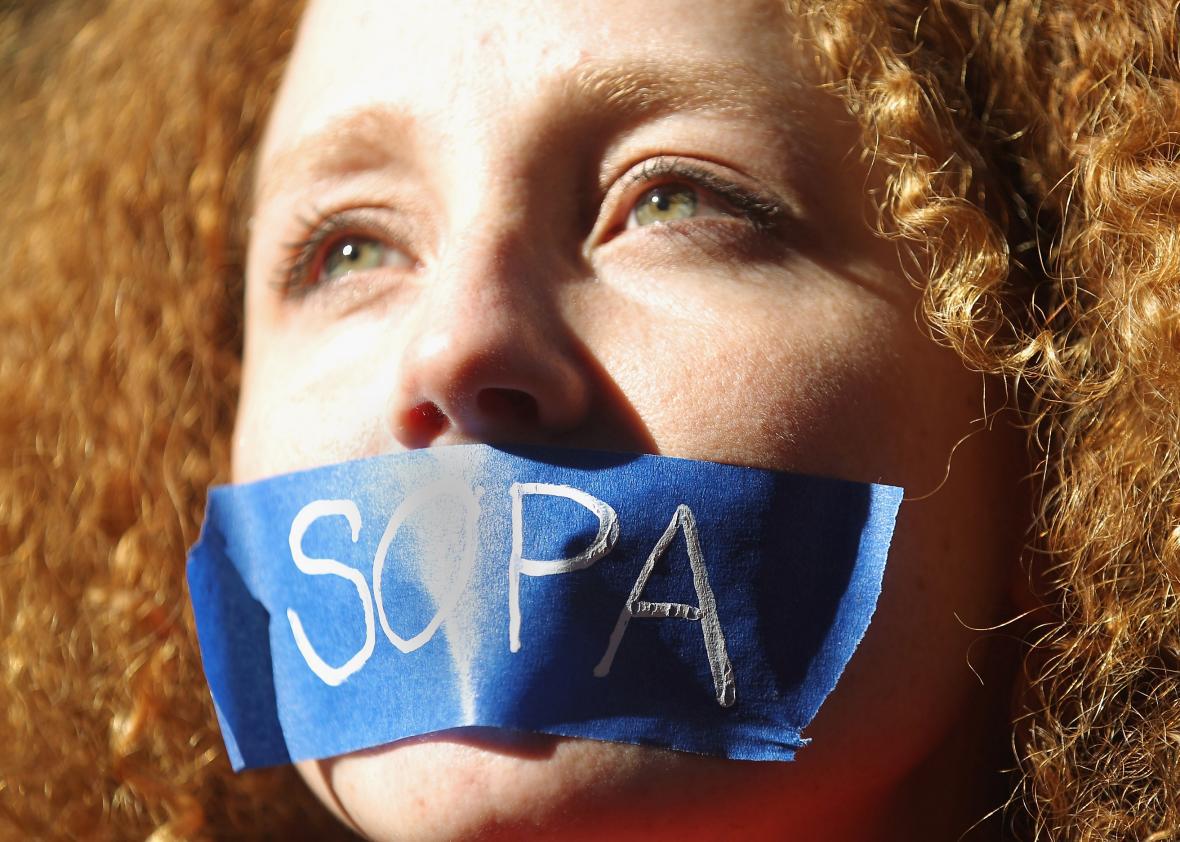Today marks the fifth anniversary of the internet uprising that put an end to politics as usual, at least where the World Wide Web is concerned. As we step into the new year, with threats against core internet protections on the horizon, it’s a good time to remember that internet users are keeping track of what their government is up to, and they stand ready to take action again, online and in real life.
Five years ago, on Jan. 18, 2012, the internet went dark. Google, Craigslist, Wikipedia, Reddit, and more than 100,000 other websites all participated in an internet blackout on an unprecedented scale to protest the Stop Online Piracy Act (SOPA) and the Protect IP Act (PIPA). Those bills, if enacted, would have led some websites to be censored based on accusations of copyright infringement.
But it wasn’t just an internet blackout. When lawmakers went to work that day, they were inundated with millions (literally millions) of calls and emails from people who cared deeply about the openness of the internet and who were willing to hold those lawmakers to account when they failed to protect it.
The bills were backed by Hollywood lobbyists that had long run the scene on Capitol Hill when it came to copyright. They were accustomed to shepherding legislation through Congress without having to worry about the kind of public attention that attaches to, say, gun control measures or reproductive rights. They expected to do so again with a bill that would create new copyright and trademark powers, but would also do real damage to the internet in the process.
They were wrong.
That day, internet users showed they could wield enough political power to defeat some of the most well-heeled lobbyists in Washington—the traditional content industry. Their calls and emails followed months of activism by a wide coalition of private and public organizations, internet companies big and small, leading internet engineers, prominent law professors, and many others, all fighting together, to convince Congress not to break the internet.
And those calls, emails, and petitions were dramatically effective: Almost overnight, many of the bills’ initial supporters withdrew their support, including several original co-sponsors of the legislation. Then, on Jan. 20, the New York Times reported that the bills were dead in the water. SOPA’s backers have since made repeat attempts to achieve the bill’s aims by other means, but after 2012’s massive mobilization, Congress has not been eager to take up similar legislation.
In the intervening years, internet users have returned to the political arena over and over to stand up against threats to freedom of expression, privacy, and internet openness. In 2012, after thousands of internet users protested across Europe, the European Parliament rejected the Anti-Counterfeiting Trade Agreement. That agreement, like SOPA and PIPA, sought to create new draconian copyright enforcement powers.
Now, internet users are using their political clout to pursue positive policy agendas as well. In 2014, they mobilized to support effective net neutrality rules at the Federal Communications Commission. Those are the rules that keep internet companies from treating the kinds of traffic they carry differently, prioritizing some while slowing, blocking or interfering with others. The FCC was poised to adopt inadequate and legally shaky rules. Thanks in large part to massive online protests and public advocacy—not to mention a timely assist from John Oliver—the FCC changed course and adopted new and effective rules. The following year, thanks in part to a petition signed by more than 570,000 internet users, saw passage of the USA Freedom Act, the first legislation in decades to begin to rein in the U.S. government’s surveillance powers.
Not every bad bill or good policy proposal will trigger this kind of response, nor should it. But our representatives are on notice: Internet users are a powerful constituency. We’re watching, and we will mobilize.
Today there are real threats to basic internet freedoms—like efforts to unravel the net neutrality rules, threats to expand surveillance and target specific communities, and private agreements between powerful companies to quietly regulate online speech. Internet users won’t be ignoring those threats. We’re paying attention, and we will hold both Washington and Silicon Valley accountable.
